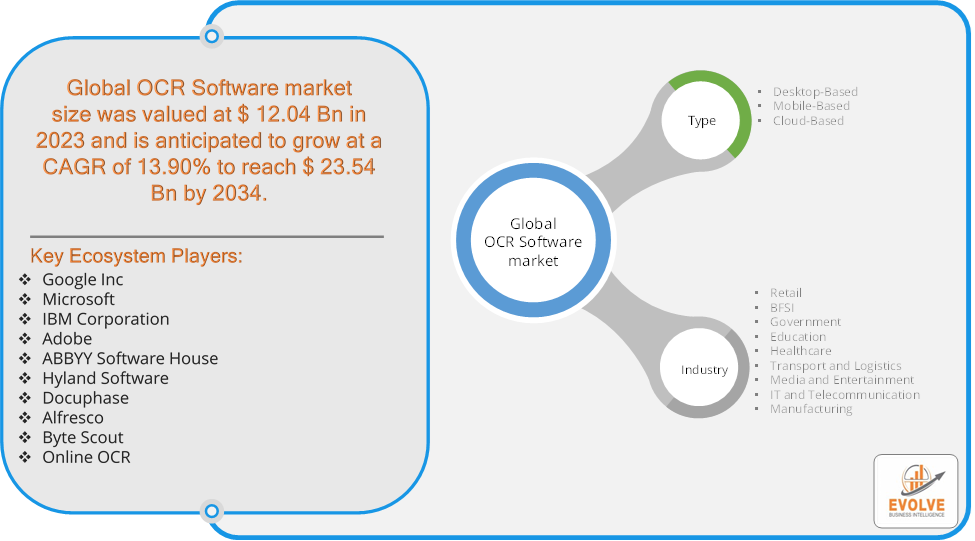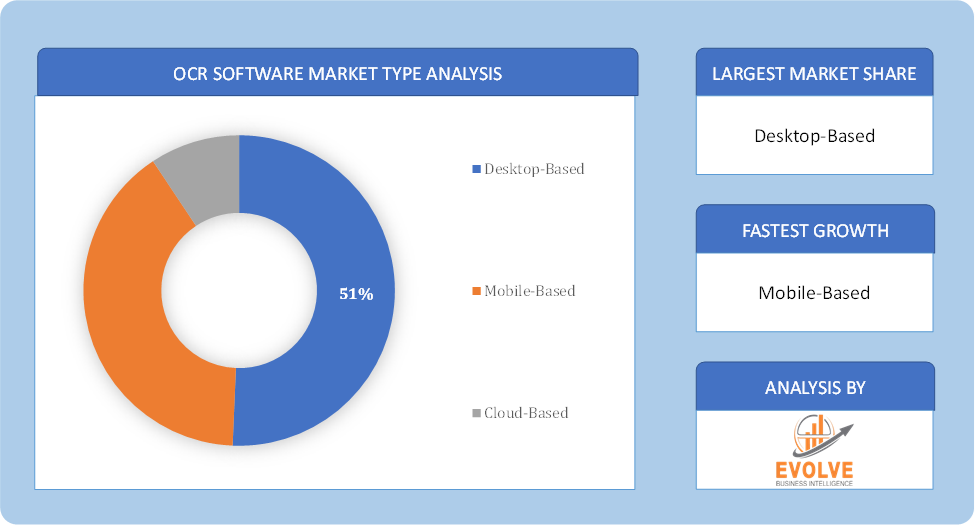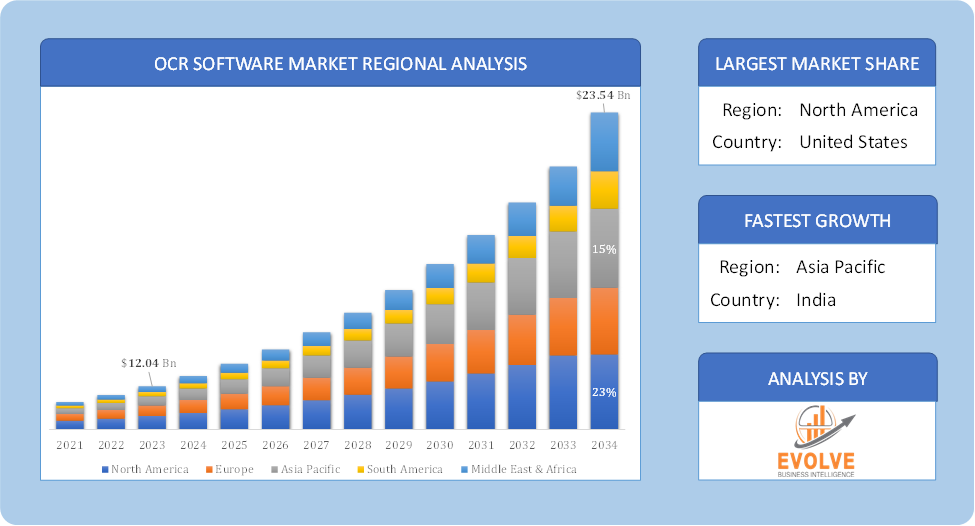Global OCR Software market Analysis and Global Forecast 2024-2034
$ 1,390.00 – $ 5,520.00Price range: $ 1,390.00 through $ 5,520.00
Global OCR Software market Research Report: Information By Type (Desktop-Based, Mobile-Based, Cloud-Based), By Industry (Retail, BFSI, Government, Education, Healthcare, Transport and Logistics, Media and Entertainment, IT and Telecommunication, Manufacturing), and by Region — Forecast till 2034
Page: 150
Global OCR Software market Overview
The Global OCR Software market size accounted for USD 12.04 Billion in 2023 and is estimated to account for 14.02 Billion in 2024. The Market is expected to reach USD 23.54 Billion by 2034 growing at a compound annual growth rate (CAGR) of 13.90% from 2024 to 2034. The Global OCR (Optical Character Recognition) Software Market refers to the market for software solutions that convert different types of documents (scanned paper documents, PDFs, images, etc.) into editable and searchable data. OCR technology is commonly used in various industries to automate data extraction, streamline workflows, and improve accuracy in digitizing printed text.
The market has been experiencing rapid growth due to advancements in machine learning and AI, which have significantly improved the accuracy and capabilities of OCR technology.
Global OCR Software market Synopsis
 OCR Software market Dynamics
OCR Software market Dynamics
The major factors that have impacted the growth of OCR Software market are as follows:
Drivers:
Ø Digital Transformation Initiatives
Organizations are increasingly adopting digital transformation strategies to enhance operational efficiency, improve customer experiences, and reduce costs. OCR software plays a crucial role in digitizing paper-based processes. Organizations require quick and easy access to information. OCR technology allows for the conversion of printed and handwritten text into editable formats, enhancing data accessibility and searchability. Continuous improvements in artificial intelligence (AI) and machine learning algorithms enhance OCR capabilities, enabling more accurate and efficient text recognition from various document types and formats.
Restraint:
- Perception of High Initial Costs and Technological Limitations
The implementation of OCR software can involve substantial upfront costs, including software acquisition, integration, and training expenses. This may deter small and medium-sized enterprises (SMEs) from adopting OCR solutions. Although OCR technology has advanced, it still faces limitations in recognizing text in images containing graphics, images with low contrast, or documents with unusual fonts and formats.
Opportunity:
⮚ AI and Machine Learning Integration
The incorporation of artificial intelligence (AI) and machine learning into OCR solutions can enhance text recognition accuracy and enable advanced features, such as context-aware processing and automatic error correction. The growing demand for cloud-based OCR services allows for scalable, flexible, and cost-effective deployment options. This enables organizations to access OCR capabilities without the burden of managing on-premises infrastructure. Integrating OCR with advanced data analytics and business intelligence tools can help organizations extract valuable insights from unstructured data, driving better decision-making and strategic planning.
OCR Software market Segment Overview
Based on Type, the market is segmented based on Desktop-Based, Mobile-Based and Cloud-Based. The Desktop-Based segment dominant the market. Desktop-based OCR software processes documents locally on the user’s device, which can enhance speed and performance without relying on internet connectivity. Users have complete control over their data and documents, reducing concerns about data privacy and security that can arise with cloud-based solutions and many desktop OCR applications offer customizable settings for specific needs, such as format preferences and output options.
By Industry
Based on Industry, the market segment has been divided into Retail, BFSI, Government, Education, Healthcare, Transport and Logistics, Media and Entertainment, IT and Telecommunication and Manufacturing. The BFSI segment dominant the market. BFSI organizations handle a vast amount of paperwork, including loan applications, contracts, invoices, and customer identification documents. OCR software enables efficient digitization and processing of these documents and There is a growing trend towards automating various processes within the BFSI sector, driven by the need for operational efficiency and improved customer service.
Global OCR Software market Regional Analysis
Based on region, the global OCR Software market has been divided into North America, Europe, Asia-Pacific, the Middle East & Africa, and Latin America. North America is projected to dominate the use of the OCR Software market followed by the Asia-Pacific and Europe regions.
 Global OCR Software North America Market
Global OCR Software North America Market
North America holds a dominant position in the OCR Software market. North America is the largest market for OCR software, accounting for a significant portion of global revenue. The region’s strong economy, advanced technology infrastructure, and high adoption rate of automation technologies are major contributors to its market dominance.
Global OCR Software Asia-Pacific Market
The Asia-Pacific region has indeed emerged as the fastest-growing market for the OCR Software market industry. The Asia Pacific region is one of the fastest-growing markets for OCR software, fueled by rapid urbanization, economic development, and increasing government initiatives to promote digitalization and the region presents significant opportunities for OCR software providers due to the large population and growing demand for automation solutions in various industries.
Competitive Landscape
The global OCR Software market is highly competitive, with numerous players offering a wide range of software solutions. The competitive landscape is characterized by the presence of established companies, as well as emerging startups and niche players. To increase their market position and attract a wide consumer base, the businesses are employing various strategies, such as product launches, and strategic alliances.
Prominent Players:
- Google Inc
- Microsoft
- IBM Corporation
- Adobe
- ABBYY Software House
- Hyland Software
- Docuphase
- Alfresco
- Byte Scout
- Online OCR
Scope of the Report
Global OCR Software market, by Type
- Desktop-Based
- Mobile-Based
- Cloud-Based
Global OCR Software market, by Industry
- Retail
- BFSI
- Government
- Education
- Healthcare
- Transport and Logistics
- Media and Entertainment
- IT and Telecommunication
- Manufacturing
Global OCR Software market, by Region
- North America
- US
- Canada
- Mexico
- Europe
- UK
- Germany
- France
- Italy
- Spain
- Benelux
- Nordic
- Rest of Europe
- Asia Pacific
- China
- Japan
- South Korea
- Indonesia
- Austalia
- Malaysia
- India
- Rest of Asia Pacific
- South America
- Brazil
- Argentina
- Rest of South America
- Middle East & Africa
- Saudi Arabia
- UAE
- Egypt
- South Africa
- Rest of Middle East & Africa
| Parameters | Indicators |
|---|---|
| Market Size | 2033: USD 607.2 Billion |
| CAGR (2024-2034) | 4.41% |
| Base year | 2022 |
| Forecast Period | 2024-2034 |
| Historical Data | 2021 (2017 to 2020 On Demand) |
| Report Coverage | Revenue Forecast, Competitive Landscape, Growth Factors, and Trends |
| Key Segmentations | Type, Industry |
| Geographies Covered | North America, Europe, Asia-Pacific, South America, Middle East, Africa |
| Key Vendors | Google Inc, Microsoft, IBM Corporation, Adobe, ABBYY Software House, Hyland Software, Docuphase, Alfresco, Byte Scout and Online OCR. |
| Key Market Opportunities | · AI and Machine Learning Integration · Enhanced Data Analytics |
| Key Market Drivers | · Digital Transformation Initiatives · Growing Need for Data Accessibility |
REPORT CONTENT BRIEF:
- High-level analysis of the current and future OCR Software market trends and opportunities
- Detailed analysis of current market drivers, restraining factors, and opportunities in the future
- OCR Software market historical market size for the year 2021, and forecast from 2023 to 2033
- OCR Software market share analysis at each product level
- Competitor analysis with detailed insight into its product segment, Government & Defense strength, and strategies adopted.
- Identifies key strategies adopted including product launches and developments, mergers and acquisitions, joint ventures, collaborations, and partnerships as well as funding taken and investment done, among others.
- To identify and understand the various factors involved in the global OCR Software market affected by the pandemic
- To provide a detailed insight into the major companies operating in the market. The profiling will include the Government & Defense health of the company’s past 2-3 years with segmental and regional revenue breakup, product offering, recent developments, SWOT analysis, and key strategies.
Press Release

Global Pharmaceutical Manufacturing Market to Reach $1.38 Trillion by 2035 with 7.35% CAGR, New Research Shows

The Global Mammography Market Is Estimated To Record a CAGR of Around 10.29% During The Forecast Period

Glue Stick Market to Reach USD 2.35 Billion by 2034

Podiatry Service Market to Reach USD 11.88 Billion by 2034

Microfluidics Technology Market to Reach USD 32.58 Billion by 2034

Ferric Chloride Market to Reach USD 10.65 Billion by 2034

Family Practice EMR Software Market to Reach USD 21.52 Billion by 2034

Electric Hairbrush Market to Reach USD 15.95 Billion by 2034

Daily Bamboo Products Market to Reach USD 143.52 Billion by 2034

Cross-border E-commerce Logistics Market to Reach USD 112.65 Billion by 2034
Frequently Asked Questions (FAQ)
What is the study period of this market?
The study period of the global OCR Software market is 2021- 2033
What is the growth rate of the global OCR Software market?
The global OCR Software market is growing at a CAGR of 13.90% over the next 10 years
Which region has the highest growth rate in the market of OCR Software market?
Asia Pacific is expected to register the highest CAGR during 2024-2034
Which region has the largest share of the global OCR Software market?
North America holds the largest share in 2022
Who are the key players in the global OCR Software market?
Google Inc, Microsoft, IBM Corporation, Adobe, ABBYY Software House, Hyland Software, Docuphase, Alfresco, Byte Scout and Online OCR. are the major companies operating in the market.
Do you offer Post Sale Support?
Yes, we offer 16 hours of analyst support to solve the queries
Do you sell particular sections of a report?
Yes, we provide regional as well as country-level reports. Other than this we also provide a sectional report. Please get in contact with our sales representatives.
Table of Contents
Chapter 1. Executive Summary Chapter 2. Scope Of The Study 2.1. Market Definition 2.2. Scope Of The Study 2.2.1. Objectives of Report 2.2.2. Limitations 2.3. Market Structure Chapter 3. Evolve BI Methodology Chapter 4. Market Insights and Trends 4.1. Supply/ Value Chain Analysis 4.1.1. Raw End Users Providers 4.1.2. Manufacturing Process 4.1.3. Distributors/Retailers 4.1.4. End-Use Industry 4.2. Porter’s Five Forces Analysis 4.2.1. Threat Of New Entrants 4.2.2. Bargaining Power Of Buyers 4.2.3. Bargaining Power Of Suppliers 4.2.4. Threat Of Substitutes 4.2.5. Industry Rivalry 4.3. Impact Of COVID-19 on the OCR Software market 4.3.1. Impact on Market Size 4.3.2. End-Use Industry Trend, Preferences, and Budget Impact 4.3.3. Regulatory Framework/Government Policies 4.3.4. Key Players' Strategy to Tackle Negative Impact 4.3.5. Opportunity Window 4.4. Technology Overview 12.28. Macro factor 4.6. Micro Factor 4.7. Demand Supply Gap Analysis of the OCR Software market 4.8. Import Analysis of the OCR Software market 4.9. Export Analysis of the OCR Software market Chapter 5. Market Dynamics 5.1. Introduction 5.2. DROC Analysis 5.2.1. Drivers 5.2.2. Restraints 5.2.3. Opportunities 5.2.4. Challenges 5.3. Patent Analysis 5.4. Industry Roadmap 5.5. Parent/Peer Market Analysis Chapter 6. Global OCR Software market, By Type 6.1. Introduction 6.2. Desktop-Based 6.3. Mobile-Based 6.4. Cloud-Based Chapter 7. Global OCR Software market, By Industry 7.1. Introduction 7.2. Retail 7.3. BFSI 7.4. Government 7.5. Education 7.6. Healthcare 7.7. Transport and Logistics 7.8. Media and Entertainment 7.9. IT and Telecommunication 7.10. Manufacturing Chapter 8. Global OCR Software market, By Region 8.1. Introduction 8.2. North America 8.2.1. Introduction 8.2.2. Driving Factors, Opportunity Analyzed, and Key Trends 8.2.3. Market Size and Forecast, By Country, 2024-2034 8.2.4. Market Size and Forecast, By Product Type, 2024-2034 8.2.5. Market Size and Forecast, By End User, 2024-2034 8.2.6. US 8.2.6.1. Introduction 8.2.6.2. Driving Factors, Opportunity Analyzed, and Key Trends 8.2.6.3. Market Size and Forecast, By Product Type, 2024-2034 8.2.6.4. Market Size and Forecast, By End User, 2024-2034 8.2.7. Canada 8.2.7.1. Introduction 8.2.7.2. Driving Factors, Opportunity Analyzed, and Key Trends 8.2.7.4. Market Size and Forecast, By Product Type, 2024-2034 8.2.7.5. Market Size and Forecast, By End User, 2024-2034 8.3. Europe 8.3.1. Introduction 8.3.2. Driving Factors, Opportunity Analyzed, and Key Trends 8.3.3. Market Size and Forecast, By Country, 2024-2034 8.3.4. Market Size and Forecast, By Product Type, 2024-2034 8.3.5. Market Size and Forecast, By End User, 2024-2034 8.3.6. Germany 8.3.6.1. Introduction 8.3.6.2. Driving Factors, Opportunity Analyzed, and Key Trends 8.3.6.3. Market Size and Forecast, By Product Type, 2024-2034 8.3.6.4. Market Size and Forecast, By End User, 2024-2034 8.3.7. France 8.3.7.1. Introduction 8.3.7.2. Driving Factors, Opportunity Analyzed, and Key Trends 8.3.7.3. Market Size and Forecast, By Product Type, 2024-2034 8.3.7.4. Market Size and Forecast, By End User, 2024-2034 8.3.8. UK 8.3.8.1. Introduction 8.3.8.2. Driving Factors, Opportunity Analyzed, and Key Trends 8.3.8.3. Market Size and Forecast, By Product Type, 2024-2034 8.3.8.4. Market Size and Forecast, By End User, 2024-2034 8.3.9. Italy 8.3.9.1. Introduction 8.3.9.2. Driving Factors, Opportunity Analyzed, and Key Trends 8.3.9.3. Market Size and Forecast, By Product Type, 2024-2034 8.3.9.4. Market Size and Forecast, By End User, 2024-2034 8.3.11. Rest Of Europe 8.3.11.1. Introduction 8.3.11.2. Driving Factors, Opportunity Analyzed, and Key Trends 8.3.11.3. Market Size and Forecast, By Product Type, 2024-2034 8.3.11.4. Market Size and Forecast, By End User, 2024-2034 8.4. Asia-Pacific 8.4.1. Introduction 8.4.2. Driving Factors, Opportunity Analyzed, and Key Trends 8.4.3. Market Size and Forecast, By Country, 2024-2034 8.4.4. Market Size and Forecast, By Product Type, 2024-2034 8.12.28. Market Size and Forecast, By End User, 2024-2034 8.4.6. China 8.4.6.1. Introduction 8.4.6.2. Driving Factors, Opportunity Analyzed, and Key Trends 8.4.6.3. Market Size and Forecast, By Product Type, 2024-2034 8.4.6.4. Market Size and Forecast, By End User, 2024-2034 8.4.7. India 8.4.7.1. Introduction 8.4.7.2. Driving Factors, Opportunity Analyzed, and Key Trends 8.4.7.3. Market Size and Forecast, By Product Type, 2024-2034 8.4.7.4. Market Size and Forecast, By End User, 2024-2034 8.4.8. Japan 8.4.8.1. Introduction 8.4.8.2. Driving Factors, Opportunity Analyzed, and Key Trends 8.4.8.3. Market Size and Forecast, By Product Type, 2024-2034 8.4.8.4. Market Size and Forecast, By End User, 2024-2034 8.4.9. South Korea 8.4.9.1. Introduction 8.4.9.2. Driving Factors, Opportunity Analyzed, and Key Trends 8.4.9.3. Market Size and Forecast, By Product Type, 2024-2034 8.4.9.4. Market Size and Forecast, By End User, 2024-2034 8.4.10. Rest Of Asia-Pacific 8.4.10.1. Introduction 8.4.10.2. Driving Factors, Opportunity Analyzed, and Key Trends 8.4.10.3. Market Size and Forecast, By Product Type, 2024-2034 8.4.10.4. Market Size and Forecast, By End User, 2024-2034 8.5. Rest Of The World (RoW) 8.5.1. Introduction 8.5.2. Driving Factors, Opportunity Analyzed, and Key Trends 8.5.3. Market Size and Forecast, By Product Type, 2024-2034 8.5.4. Market Size and Forecast, By End User, 2024-2034 Chapter 9. Company Landscape 9.1. Introduction 9.2. Vendor Share Analysis 9.3. Key Development Analysis 9.4. Competitor Dashboard Chapter 10. Company Profiles 10.1. Google Inc 10.1.1. Business Overview 10.1.2. Government & Defense Analysis 10.1.2.1. Government & Defense – Existing/Funding 10.1.3. Product Portfolio 10.1.4. Recent Development and Strategies Adopted 10.1.5. SWOT Analysis 10.2. Microsoft 10.2.1. Business Overview 10.2.2. Government & Defense Analysis 10.2.2.1. Government & Defense – Existing/Funding 10.2.3. Product Portfolio 10.2.4. Recent Development and Strategies Adopted 10.2.5. SWOT Analysis 10.3. IBM Corporation 10.3.1. Business Overview 10.3.2. Government & Defense Analysis 10.3.2.1. Government & Defense – Existing/Funding 10.3.3. Product Portfolio 10.3.4. Recent Development and Strategies Adopted 10.3.5. SWOT Analysis 10.4. Adobe 10.4.1. Business Overview 10.4.2. Government & Defense Analysis 10.4.2.1. Government & Defense – Existing/Funding 10.4.3. Product Portfolio 10.4.4. Recent Development and Strategies Adopted 10.12.28. SWOT Analysis 10.5. ABBYY Software House 10.5.1. Business Overview 10.5.2. Government & Defense Analysis 10.5.2.1. Government & Defense – Existing/Funding 10.5.3. Product Portfolio 10.5.4. Recent Development and Strategies Adopted 10.5.5. SWOT Analysis 10.6. Hyland Software 10.6.1. Business Overview 10.6.2. Government & Defense Analysis 10.6.2.1. Government & Defense – Existing/Funding 10.6.3. Product Portfolio 10.6.4. Recent Development and Strategies Adopted 10.6.5. SWOT Analysis 10.7. Docuphase 10.7.1. Business Overview 10.7.2. Government & Defense Analysis 10.7.2.1. Government & Defense – Existing/Funding 10.7.3. Product Portfolio 10.7.4. Recent Development and Strategies Adopted 10.7.5. SWOT Analysis 10.8 Alfresco 10.8.1. Business Overview 10.8.2. Government & Defense Analysis 10.8.2.1. Government & Defense – Existing/Funding 10.8.3. Product Portfolio 10.8.4. Recent Development and Strategies Adopted 10.8.5. SWOT Analysis 10.9 Byte Scout 10.9.1. Business Overview 10.9.2. Government & Defense Analysis 10.9.2.1. Government & Defense – Existing/Funding 10.9.3. Product Portfolio 10.9.4. Recent Development and Strategies Adopted 10.9.5. SWOT Analysis 10.10. Online OCR 10.10.1. Business Overview 10.10.2. Government & Defense Analysis 10.10.2.1. Government & Defense – Existing/Funding 10.10.3. Product Portfolio 10.10.4. Recent Development and Strategies Adopted 10.10.5. SWOT Analysis
Connect to Analyst
Research Methodology










